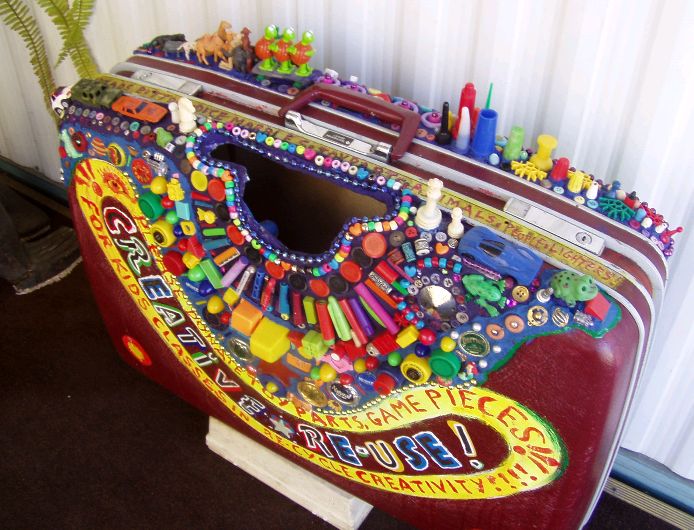What can you do to make Zero Waste a reality?
Ultimately it all has to come down to what people do. The changes we need for every progressive change come from some group, but is it going to be a Congress, an army, an organization or the movement of many ordinary people?
The wonderful thing about the ZW approach, that sharply distinguishes it from the recycling approach, is that ZW does not require millions of people to individually raise their consciousness. Once a working and effective design is implemented, it becomes the normal, conserving way to do things. The pathways exist to be used by everyone with hardly a thought and the mechanisms, such as a Reuse and Repair Station or a Refilling Station can be made use of. So ZW approaches don’t require that everyone remember to bring broken cement rubble to a rubble recycler for example. Cement pieces will not be just turned into rubble but are designed to be disassembled and reused.
Instead of there being Fifty Ways That YOU Can Save The Earth in your daily life, what you need to do is to start the ball rolling toward new designs. You can work with companies in your neighborhood to redesign their products so that after they are sold, the users necessarily reuse them over and over. It is not enough that the company merely recycle some scraps – that is a minor effort. Redesigning its products for reuse is far more important. This is where you can bring a vital lesson to industries you are close to or work with.
But, if your goal is be hands-on, to do it personally in your own life, here is a blog about how to do that that explores that approach better than I can.
But don’t drink their Koolaid. The people who manage your garbage are delighted to see you make ineffectual consumer changes to reduce your garbage output. For every person trying to reduce, there are a thousand who can’t be bothered. So long as they can design the commercial system to depend on selling junk and collecting garbage, they are not threatened by your efforts to reduce your personal garbage. They will herald your campaign in their newspapers, contribute to your conferences and fund your video. It all makes them look like responsible business leaders while changing nothing. You need to move on to a higher level of controlling social designs.
You can also work with your local politicians to make changes. Sponsor a contest for a best design for a local refilling station. Pressure your city council to install drinking water fountains everywhere (specially designed of course) to divert the obsession with bottled water. The council can also make demands on their state government for research into new and better designs. A single state can turn around the tsunami of appliance discard by putting in place new social designs that enforce repair.
Join the Zero Waste Institute and form a local chapter of like-minded conservers. Don’t waste time looking backwards into the details of garbage collection. It will all become progressively obsolete in the world of Zero Waste. Believe in your ability to see the future, and know that it can be brighter than this wasteful society.
Be the change you want to see in the world. – Mahatma Ghandi
This has a direct meaning in the world of Zero Waste. The new philosophy for design takes place outside of the conventional box. Zero Waste designs are all new and exciting ways to maintain the utility of resources for many decades. That means that Zero Waste creates new products. And as an enterprising, entrepreneurial kind of person, you can start a new business to manufacture and sell new products that look to the future.
Some people will tell you that all you have to do to make the world a better place is to purchase intelligently. Sorry, shopping is not going to do it. Here’s what Jeffry Fawcett has to say about that as he discusses whether Michelle Obama’s garden is going to save the planet:
“The implicit—and sometimes explicit—hope behind the kind of thing that’s happening at the White House is that in emulating our leaders, we as a nation will have an awakening to the virtues of home-grown food. …
This doesn’t make sense because it puts the burden for changing our food culture entirely on the shoulders of consumers. Believing that consciousness-raising wonders such as an organic garden nestled in the South Lawn of the White House will be the vanguard of a food revolution relies on the bankrupt ideology of consumer sovereignty, an ideology that where consumers go, industry must follow. It’s an ideology promoted by industry. It’s an ideology in the old sense of the concept: ideas that lead us to put great effort into achieving goals that ultimately are not in our best interests.”
And:
“In other words, it’s the production side, not the consumption side that’s driving this bus.” Read the rest of Jeffry’s article.
It’s true! Making Zero Waste modifications is not hard. But it takes planning, understanding and thinking about new designs. It is not going to come with a snap of the fingers, just because you want to be really, really green. There are fifty ways to save the earth, but they are fifty careful redesigns to avoid discard, not just reusing last year’s Xmas cards.
Zero Waste progress will come when there is Zero Waste activism. In a recent interview, Bill McKibben, the founder of the 350.org movement for reining in climate change, made these observations at the Cancun conference in December 2010:
“It’s just like a family reunion aboard the Titanic.We can’t keep doing this. Until we can build some power outside of these arenas to actually push these guys, in the end it’s not about how well people are communicating, or how great the policy papers are. It’s about who has the power, and at the moment, that power rests in the hands of the fossil fuel industry and their allies in governments around the world, and until we build some outside movement power to push back, we’re going to get scraps from the table at the very best.”
In the same way, the fight to redesign away from discard will get nowhere until the dreadful power of the garbage industry to define all the terms of the argument is broken. When the garbage industry joins with recyclers to declare that Zero Waste is no more than recycling garbage after it is too late, the politicians slavishly follow. Until some power constituent stands up for the planet’s resources, the planet will have no seat at the table.
That’s where you come in. There are many organizations already working in one way or another on resource issues. But the garbage industry has covered their eyes with rose colored glasses. For example, the Sierra Club has chapters in every state but they support the garbage industry positions exclusively, and never mention design as the critical weapon of choice. You need to join recycling groups anywhere and everywhere and re-educate them in the ways of Zero Waste design to eliminate discard.
Artists have a special place in reuse. Here are some pieces made in Sebastopol by Nico from discarded plastics and other decorations:
 |
 |
And a way to reuse your briefcase artistically: |
 |
